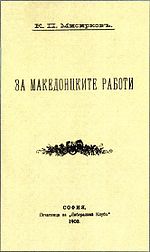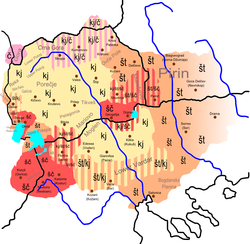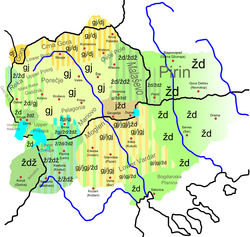- Dialects of Macedonian
-
Macedonian language

- Macedonian language
- Macedonistics
- Sign language
- Standard Macedonian
- Spoken Macedonian
- Naming dispute
- Political views
- Geographical distribution
- Regulatory body
- History
- Literature
- Dialects
- Grammar
- Macedonian lexicon
- Orthography
The dialects of Macedonian comprise the Slavic dialects spoken in the Republic of Macedonia as well as some varieties spoken in the wider geographic region of Macedonia.[1] They exist as part of the dialect continuum of South Slavic languages that joins the Macedonian language with Bulgarian to the east and Serbian to the north. Prior to their codification in 1945, Macedonian dialects were for the most part classified as Bulgarian.[2][3][4]
After that the delimitation between this languages, especially with Bulgarian, is fleeting and controversial. Macedonian authors tend to treat all dialects spoken in the geographical region of Macedonia as Macedonian, including those spoken in the westernmost part of Bulgaria (so-called Pirin Macedonia), whereas Bulgarian authors treat all Macedonian dialects as part of the Bulgarian language.[5][6] In Greece, the identification of the dialects spoken by the local Slavophone minority with either Bulgarian or Macedonian is often avoided, and these dialects are instead described simply as "Slavic",[7] Dopia ('Local'), Stariski (old) or Našinski (ours).
The dialects of Macedonia in the wider sense can be divided into Eastern and Western groups (the boundary runs approximately from Skopje and Skopska Crna Gora along the rivers Vardar and Crna), based on a large group of features. In addition, a more detailed classification can be based on the modern reflexes of the Proto-Slavonic reduced vowels ("yers"), vocalic sonorants and the back nasal (o). That classification distinguishes between the following 3 major groups[8][9]::
Contents
Dialects
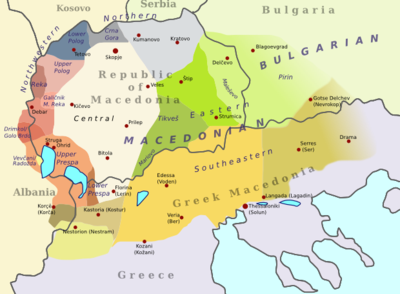
Dialect divisions of Macedonian[10] - Northern
Lower PologUpper PologCrna GoraKumanovo / Kratovo- Western/Northwestern
CentralRekaMala Reka / GaličnikDebarDrimkol / Golo BrdoVevčani / RadοždaUpper Prespa / Ohrid- Eastern
Mariovo / TikvešŠtip / StrumicaMaleševo / Pirin- Southeastern
Solun / VodenSer / Drama- Southwestern
Lower PrespaKorčaKosturNestramNorthern dialects
- Western group:
- Eastern group:
- Kumanovo dialect
- Kratovo dialect
- Kriva Palanka dialect
- Ovče Pole dialect
Western Dialects:
- Central group:
- Western and north western group:
- Upper Polog dialect
- Reka (torbeš) dialect
- Galιčnik (malorekanski or Mala Reka) dialect[13]
- Debar dialect
- Drimkol-Golo Brdo dialect
- Vevčani-Radοža dialect[14]
- Struga dialect
- Ohrid dialect
- Upper Prespa dialect
- Lower Prespa dialect
Eastern and Southern dialects
- Eastern group:
- Tikveš-Mariovo dialect
- Štip-Strumica dialect
- Maleševo-Pirin dialect[15]
- South-western group[16]:
- Nestram-Kostenar dialect
- Korča (Gorica) dialect
- Kostur dialect
- South-eastern group:
Most linguists classify the dialects in the Pirin (Blagoevgrad) region of Bulgaria and in the far east of Greek Macedonia as Bulgarian, and the dialects in the rest of Greece and in Republic of Macedonia as Macedonian.[18][19]
Variation in consonants
As far as consonantal features are concerned, the entire Western region is distinguished from the East by loss of /x/ (except Tetovo, Gora and Korča) and the loss of /v/ in the intervocalic position (except Mala Reka and parts of Kostur-Korča): /ɡlava/ (head) = /ɡla/, /ɡlavi/ (heads) = /ɡlaj/. The Eastern region preserves /x/ (except Tikveš-Mariovo and Kumanovo-Kriva Palanka) and intervocalic /v/. The East is also characterised by the development of epenthetic /v/ before original /o/ where the West has epenthetic /j/: Eastern /vaɡlɛn/ (coal) but Western /jaɡlɛn/. The diphonemic reflexes are most characteristic of the dialects of Greek Macedonia and Blagoevgrad province, Kostur-Korča and Ohrid-Prespa. The Serres - Nevrokop dialects have a series of phonemically palatalised consonants.
Variation in word stress and its effects on vowels
The Western dialects generally have fixed stress, antepenultimate in the Republic of Macedonia, and penultimate in Greece and Albania. The Eastern region, along with the neighbouring Bulgarian dialects, has various non-fixed stress systems. In Lower Vardar and Serres-Nevrokop unstressed /a, ɛ, ɔ/ are reduced (raised) to [ə, i, u]. The reduction of unstressed vowels (as well as the aforementioned allophonic palatalisation of consonants) is characteristic of East Bulgarian as opposed to West Bulgarian dialects, so these dialects are regarded by Bulgarian linguists as transitional between East and West Bulgarian.
References
- ^ isp. Большaя Советская Энциклопедия, tom. 37, Moskva 1938, р 743–744
- ^ Mazon, Andre. Contes Slaves de la Macédoine Sud-Occidentale: Etude linguistique; textes et traduction; Notes de Folklore, Paris 1923, p. 4.
- ^ Селищев, Афанасий. Избранные труды, Москва 1968.
- ^ K. Sandfeld, Balkanfilologien (København, 1926, MCMXXVI).
- ^ Institute of Bulgarian Language (1978) (in Bulgarian). Единството на българския език в миналото и днес. Sofia: Bulgarian Academy of Sciences. p. 4. OCLC 6430481.
- ^ Стойков (Stoykov), Стойко (2002) [1962] (in Bulgarian). Българска диалектология (Bulgarian dialectology). София: Акад. изд. "Проф. Марин Дринов". ISBN 9544308466. OCLC 53429452. http://www.promacedonia.org/jchorb/st/index.htm.
- ^ Ethnologue By Barbara F. Grimes, Richard Saunders Pittman, Joseph Evans Grimes, Summer Institute of Linguistics ISBN 0883128152, 9780883128152
- ^ стр. 244 Македонски јазик за средното образование- Стојка Бојковска, Димитар Пандев, Лилјана Минова-Ѓуркова, Живко Цветковски- Просветно дело- Скопје 2001
- ^ Z. Topolińska- B. Vidoeski, Polski~macedonski- gramatyka konfrontatiwna, z.1, PAN, 1984
- ^ After Z. Topolińska and B. Vidoeski (1984), Polski-macedonski gramatyka konfrontatiwna, z.1, PAN.
- ^ стр.68 Граматика на македонскиот литературен јазик, Блаже Конески, Култура- Скопје 1967
- ^ Академик Божидар видоески, Кичевскиот говор. МЈ, 1957, VIII, 1, стр. 31-90.
- ^ Belić 1935: A. Belić, Galički dijalekat, Srpski dijalektološki zbornik, VII, Srpska kraljevska akademija, Beograd – Sr. Karlovci, 1-352+IV
- ^ The Radožda-Vevčani Dialect of Macedonian: Structure, Texts, Lexicon by P. Hendriks. The Slavic and East European Journal, Vol. 22, No. 1 (Spring, 1978), pp. 111-112
- ^ A comparative historical analysis of nominal accentuation in archaic (Maleševo) and transitional (Nivičino) Eastern Macedonian dialects," in Proceedings of the Third North American-Macedonian Conference on Macedonian Studies. Indiana Slavic Studies 10:135-151. 1999
- ^ Македонските дијалекти во Егејска Македонија: (Обид за класификација). Македонските дијалекти во Егејска Македонија: научен собир, Скопје 23-24 декември 1991. Скопје: МАНУ, 1994, стр. 23-60.
- ^ a b str. 249- 252 Makedonski jazik za srednoto obrazovanie- S.Bojkovska, D.Pandev, L.Minova-Ǵurkova, Ž.Cvetkovski- Prosvetno delo AD- Skopje 2001
- ^ Trudgill P., 2000, "Greece and European Turkey: From Religious to Linguistic Identity". In: Stephen Barbour and Cathie Carmichael (eds.), Language and Nationalism in Europe, Oxford : Oxford University Press, p.259.
- ^ Schmieger, R. 1998. "The situation of the Macedonian language in Greece: sociolinguistic analysis", International Journal of the Sociology of Language 131, 125-55.
Dialects of Macedonian Western CentralWestern and
northwesternUpper Polog · Debar · Drimkol-Golo Brdo · Galičnik · Reka · Vevčani-Radožda · Struga · Ohrid · Upper Prespa · Lower Prespa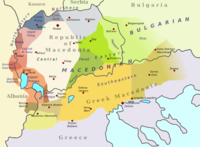
Northern EasternWesternSoutheastern EasternSoutheastern1 Also considered a dialect of Bulgarian. 2 Considered to be a part of the transitional Torlak dialect and as a subdialect of Bulgarian, Macedonian, and Serbo-Croatian. - Macedonian language
Wikimedia Foundation. 2010.

